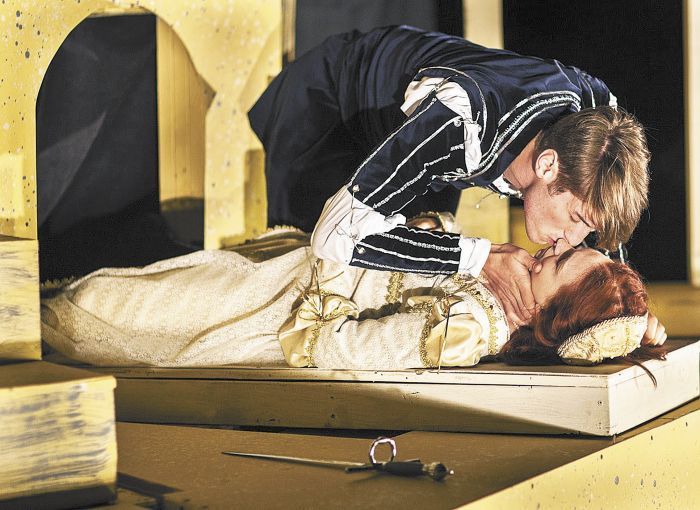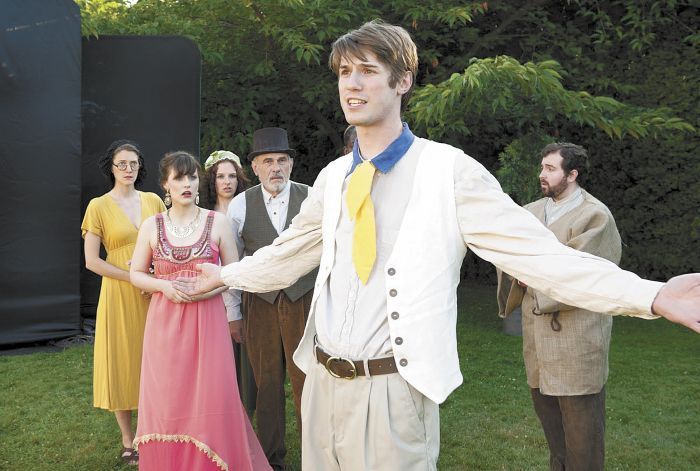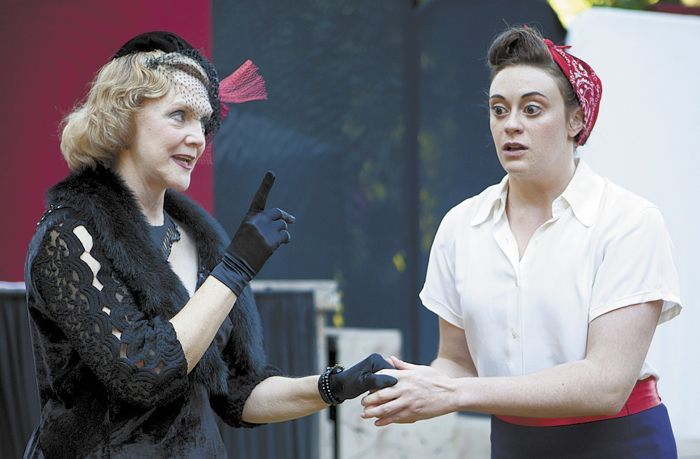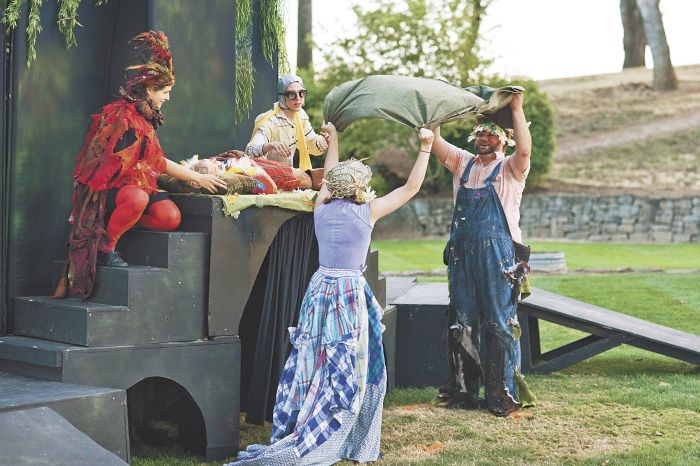All the World's a Stage
Willamette Shakespeare performs the bard’s lines among the vines




Willamette Shakespeare performs the bard’s lines among the vines
Story by Mark Stock | Photos by Jim Folts
Hamlet. Daniel Somerfield seems awestruck by the name alone, one so many students naively associate with dense reading, tricky quizzes or even trickier performances.
Not Somerfield, an Oberlin College grad who spends his days in a Nike office and his summer evenings presenting William Shakespeare to Oregon wine country. He’s pulling quotes from 400-year- old-plus tragedy with ease, still moved by their powers.
“Hamlet is my favorite play ever written,” said Somerfield, matter-of-factly. “But frankly, I’m a little intimidated by it.”
Since 2008, Somerfield has delivered a play every year at a handful of wineries with the help of talented casts, generous volunteers and even more benevolent donors. The project, cleverly dubbed Willamette Shakespeare, started with “As You Like It,” one of the great dramatist’s often overlooked comedies. This was at a time when Somerfield trucked the entirety of the set, equipment and wardrobe in his tiny Toyota.
“It was very rustic,” said Somerfield. “But it was also pretty popular considering nobody knew who we were.”
His was not an entirely foreign concept. Somerfield had been doing essentially the same in Seattle before he moved to Oregon in 2006. He worked for Green Stage in the Emerald City, treating park goers to hits from the Elizabethan era. But there was a void in Oregon’s most famous winegrowing valley, one that he thought he could fill.
“I thought the vineyard was an even more exciting possibility,” said Somerfield. “There was great wine, there were great restaurants, there was a smattering of visual arts, but there wasn’t a lot of performing arts.”
Somerfield’s wife, Sydney, an Oregon native, helped launch the project. She studied Theater Arts at the University of Oregon and has since gone on to help direct and act in some of Willamette Shakespeare’s slowly growing catalogue. She is currently the artistic director and, like her husband, a member of the board.
Coordinating with theater types in the valley, Somerfield managed to get some backing for his plan. He found a partner in Jim Halliday, a Ribbon Ridge vineyard owner with an extensive background in acting, directing, theater and music. He also aligned with David Baer, a stage specialist with more than a decade of experience on Broadway. Baer’s story was like so many presently in wine country: He gave into wine, fleeing a perfectly good job in New York for the twinkling lure of the Pacific Northwest.
Soon, Somerfield had the beginnings of a theater project. He was engaging in occasional sales and cellar stints at Oregon wineries, familiarizing himself with the area and its famous exports — it is fitting that the land of Pinot Noir was also the land of hazelnuts, the preferred snack of Elizabethan audience members taking in Globe Theatre shows more than four centuries ago.
Oregon, a state famous for its Shakespeare Festival, really offered nothing of the sort north of Ashland.
As much as Somerfield appreciates the context of performing in a vineyard setting, that’s not the point. This is the same person who’s seen some of the best Shakespeare unfold in tiny black box theaters. Wine country is beautiful — Somerfield, in fact, sounds downright giddy at the prospect of performing at Ponzi’s new facility this summer — but it’s the performance that takes priority.
“I believe in absolute authenticity,” Somerfield said. “But I think you can do authentic Shakespeare set in a disco or a submarine. Authenticity means being true to the spirit of the play, the language of the play,” he said. “If you try to bend it to your will, you’ll probably fail.”
He does appreciate the “synchronicity” between what the audience wants and what his performers hope to provide, especially amid the open spaces and gorgeous, geometric vineyard rows of Stoller Family Estate. In many ways, the Willamette Valley is a step back in time, with its lightly developed towns, vibrant farmland and untouched forested expanses. A rendition of “Twelfth Night” here, which Willamette Shakespeare has planned for select dates this August and will begin rehearsing for in mid-June, seems downright idyllic.
During Shakespeare’s time, roughly bookended by the years 1592 and 1610, much of his work was performed in his native England. The most famous venue was the Globe Theatre, constructed by Shakespeare’s company, the Lord Chamberlain’s Men, on the bank of the River Thames in London. Here, during the first performance of Henry III, it is believed that the stage caught fire, only to be quenched by ale. And when this stage sagged to one side or another, or so the rumor goes, workers used hazelnuts to level it. Anecdotes like this feel so Oregonian, even though they took place roughly 250 years before Oregon became a state.
Transplanting timeless stories from one of our planet’s greatest storytellers from Elizabethan England to nowadays Oregon wine country seems natural. Somerfield would be the first to tell you that masterful works like Titus Andronicus can’t be re-achieved the same way they were originally, but the combination of intimate theater and a vineyard setting are close to a solid replica. Wine country, while young here in America, has always stood for something much older and it’s doubly so when iambic pentameter strolls in.
And while there’s always been an intimacy about Willamette Shakespeare’s shows, there has also been growth. Somerfield estimates that the 1,050 or so audience members his troop entertained in 2009 have ballooned to almost 3,000 — Stoller performances routinely draw 300 to 400 theater-goers. As a sign of the slightly expanding times, Somerfield’s actors will wear microphones this year for the first time.
The shows continue to be free and open to the public. In this sense, Willamette Shakespeare is a model nonprofit, making ends meet via a community-based, pass-the-hat philosophy. His cast members have day jobs, rehearsing five to six nights a week in early summer out of sheer passion and devotion. This summer, the actors will represent the Northwest Classical Theater Company (NCTC), a Portland-based outfit that has teamed up with Willamette Shakespeare in the past. Somerfield has directed five of the seven plays thus far, but this year he is handing the reins to Grant Turner, the founder of NCTC.
Complimentary admission is worth noting as many companies charge a premium price for Shakespeare. For example, Oregon Shakespeare Festival tickets, on average, range from $25 to $120 a seat. Granted, many of these shows take place in one of the nation’s oldest Elizabethan theaters by a company first started in 1935. Ashland may have put the Northwest’s love of Shakespeare on the map — formalized it, even — but the Willamette Valley is bringing that appreciation literally down to earth: attendees watch from blankets on the lawns of various wineries.
Even Elizabethan playgoers paid for Shakespeare. The poorest audience members, dubbed groundlings, were charged a penny to enter the “yard.” The crowds of the turn of the 17th century were far noisier, jostling for space and views as though in the pit of a rock concert. Libations, snacks and merchandise were sold, too, creating a festive, market-like atmosphere. With wealthier patrons sitting higher up in reserved areas, the original Globe Theatre proved a stark cross section of the era’s sharp socioeconomic divide.
“Twelfth Night,” according to Somerfield, is a mid-Shakespeare piece that’s a bit more free-flowing, the theater equivalent of jazz or the blues. “We were looking for a comedy because we had just done Romeo and Juliet,” said Somerfield. “I think [Twelfth Night] has great balance. It has action, there’s a fight scene or two; it has a great villain and great roles for women.”
The play comes out of an interesting transitional era where, as Somerfield says, off-the-wall comedy is hit with some subtlety and melancholy.
“Othello,” “King Lear” and “Macbeth” are all household names but jibe less with the Willamette Shakespeare gospel. Some of these major epics, Somerfield argues, are a bit claustrophobic and intended for the indoors. The Willamette Valley demands airier stories, especially during the long and lazy days of August. Moreover, the theater company is painting in broader strokes, looking to draw a wider audience with what some may interpret as lighter-hearted material. These are family-friendly performances engaging every audience member.
Thus far, Willamette Shakespeare has tackled “As You Like It,” “A Midsummer Night’s Dream,” “All’s Well That Ends Well,” “Much Ado About Nothing,” “Pericles” and this past season “Romeo and Juliet.” Somerfield’s crew has performed in windstorms and on balmy summer evenings. As he rehashes some tales from the road, he may not realize it, but he sounds like a seasoned winegrower.
“People are doing a whole lot of work for, quite frankly, not a lot of money,” he said of his team, gratefully. He’s speaking from his own day job at Nike during a lunch break. The self-described “theater practitioner” uses the same water cooler and color copier at the Beaverton headquarters that has sent so many bright minds to Willamette Valley cellars and tasting rooms. Yet, the project, once an auspicious truckload of theater stuff, has moved into a much bigger truck. Better still, Somerfield says they’re making budget every year.
“Create something with a message that resonates, that’s authenticity,” Somerfield says. His theatrical mantras sound so much like those of winemakers I can’t differentiate anymore. Before long, though, he’s talking Hamlet again, and I see how invested he is and in what capacity.
“A lot of plays have been written to be read,” Somerfield said. “Shakespeare has been written to be performed.”
Mark Stock, a Gonzaga grad, is a Portland-based freelance writer and photographer with a knack for all things Oregon. He currently works at Vista Hills Winery. Photographer Jim Folts is a professor of photography at Oregon State.
Twelfth Night {2014 Season}
Willamette Shakespeare will be presenting “Twelfth Night.” Event is free to the public. No outside alcohol permitted. See www.willametteshakespeare.org for times and more details.
August 1–3: Stoller Family Estate
16161 N.E. McDougall Road, Dayton
503-864-3404 | www.stollerfamilyestate.com
August 8–10: Montinore Estate
3663 S.W. Dilley Road, Forest Grove
503-359-5012 | www.montinore.com
August 15–17: Ponzi Vineyards
19500 S.W. Mountain Home Road, Sherwood
503-628-1227 | www.ponziwines.com












